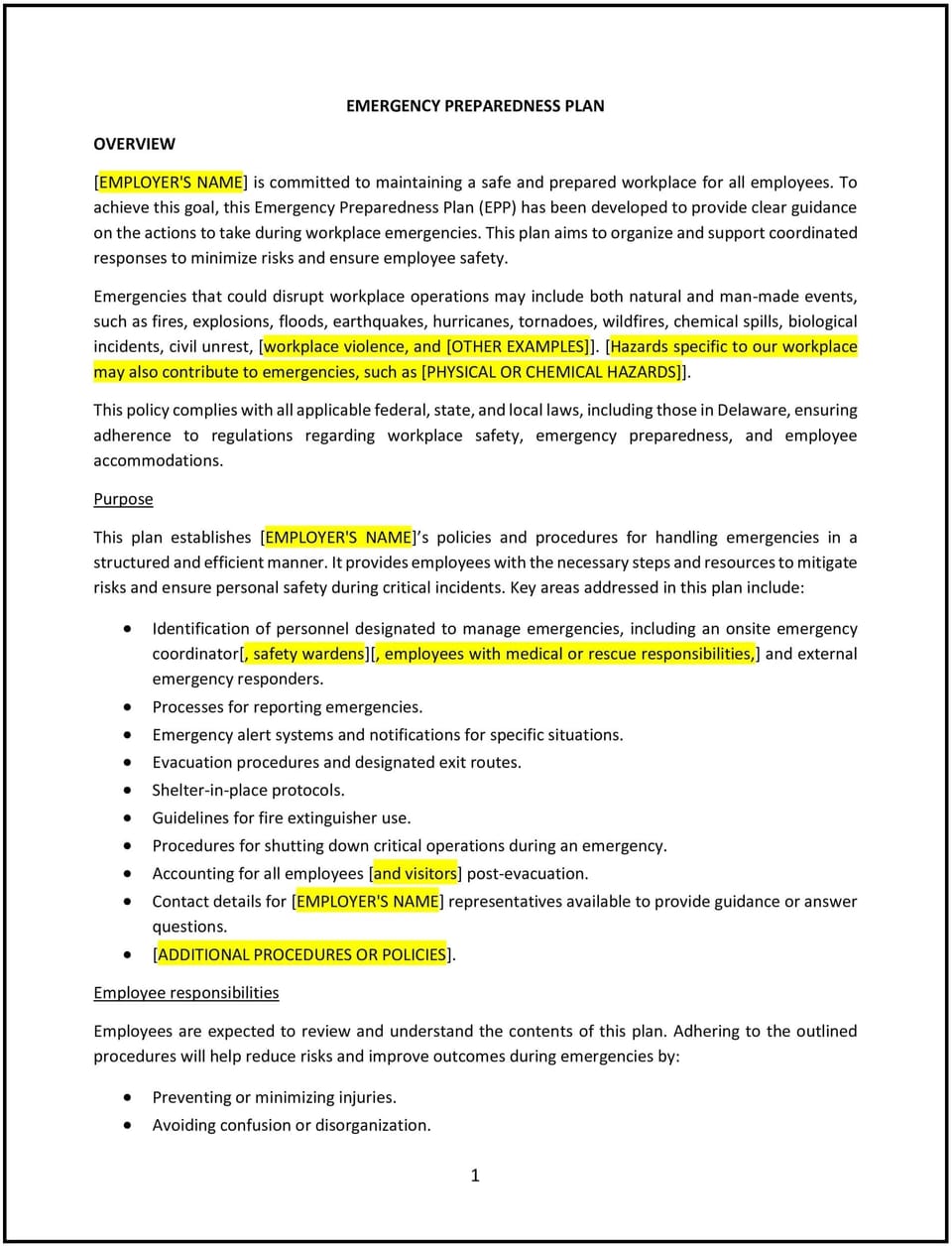Emergency preparedness plan (Delaware): Free template

Emergency preparedness plan (Delaware)
An emergency preparedness plan helps Delaware businesses establish procedures to respond effectively to emergencies such as natural disasters, fires, workplace accidents, or other critical incidents. This plan outlines roles, responsibilities, and resources to ensure employee safety, minimize disruptions, and comply with Delaware safety regulations.
By implementing this plan, businesses can protect employees, maintain operations, and reduce potential risks during emergencies.
How to use this emergency preparedness plan (Delaware)
- Identify potential risks: Conduct a risk assessment to identify emergencies relevant to your location and industry, such as floods, power outages, or chemical spills.
- Establish response procedures: Create step-by-step actions for each type of emergency, including evacuation routes, shelter-in-place protocols, and communication plans.
- Assign roles and responsibilities: Designate an emergency response team and outline their duties, such as coordinating evacuations, managing first aid, or liaising with emergency services.
- Train employees: Provide regular training on emergency procedures, including evacuation drills, first aid, and the use of emergency equipment.
- Communicate clearly: Ensure employees are aware of the plan, their roles, and where to access emergency supplies and information.
- Review and update regularly: Periodically review and update the plan to reflect changes in Delaware laws, workplace layout, or emerging risks.
Benefits of using this emergency preparedness plan (Delaware)
This plan offers several benefits for Delaware businesses:
- Protects employee safety: Reduces risks to employees by ensuring clear and effective emergency procedures are in place.
- Minimizes disruptions: Helps businesses recover quickly and maintain operations during and after emergencies.
- Ensures compliance: Aligns with Delaware and federal workplace safety regulations, reducing the risk of fines or penalties.
- Builds confidence: Demonstrates the company’s commitment to employee well-being and readiness to handle emergencies.
- Reduces liability: Provides a clear framework for addressing emergencies, minimizing potential legal and financial risks.
Tips for using this emergency preparedness plan (Delaware)
- Conduct regular drills: Test emergency procedures with periodic drills to ensure employees are familiar with their roles and responsibilities.
- Maintain emergency supplies: Stock essential items, such as first aid kits, fire extinguishers, and communication tools, in accessible locations.
- Use technology: Leverage apps or alert systems to communicate with employees during emergencies quickly.
- Partner with local agencies: Collaborate with Delaware emergency services to enhance preparedness and response efforts.
- Evaluate after incidents: Review the plan after any emergency to identify areas for improvement and update procedures accordingly.
Q: Why is an emergency preparedness plan important for my business?
A: This plan ensures employee safety, minimizes operational disruptions, and helps businesses comply with Delaware workplace safety laws during emergencies.
Q: What types of emergencies should be addressed in this plan?
A: The plan should address emergencies such as natural disasters, fires, chemical spills, workplace violence, and any other risks specific to your location or industry.
Q: How can my business ensure employees are prepared for emergencies?
A: Businesses can conduct regular training and drills, provide clear communication about emergency procedures, and ensure employees know where to find emergency supplies and information.
Q: What should be included in an evacuation procedure?
A: Evacuation procedures should include designated routes, assembly points, roles for managing evacuations, and protocols for assisting individuals with disabilities.
Q: How often should this plan be reviewed?
A: The plan should be reviewed annually or whenever there are changes in Delaware laws, workplace conditions, or new risks to ensure its continued relevance and effectiveness.
This article contains general legal information and does not contain legal advice. Cobrief is not a law firm or a substitute for an attorney or law firm. The law is complex and changes often. For legal advice, please ask a lawyer.


